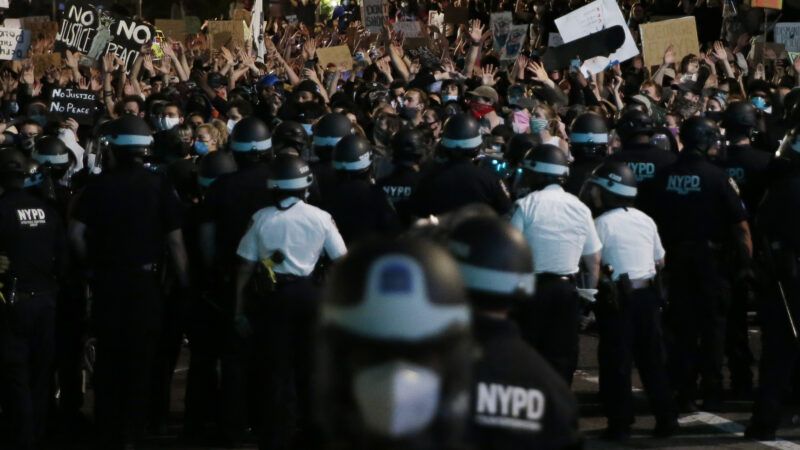New York City Ends Qualified Immunity for Police Officers
It is the first city in the U.S. to do so.

The New York City Council on Thursday voted to end qualified immunity for police officers, becoming the first city in the country to take such a step. Mayor Bill de Blasio has indicated that he will sign the measure.
The legal doctrine of qualified immunity makes it notoriously difficult to sue government officials when they violate your rights, requiring plaintiffs to find a previous court precedent that addresses a case with almost identical facts.
In a statement, the council said the legislation will protect "New Yorkers against unreasonable search and seizures and against excessive force and ban the use of qualified immunity, or substantially equivalent immunities, as a defense."
Per the bill, victims of police misconduct would be able to sue officers under local statutes, as qualified immunity remains in place at the federal level. Colorado and Connecticut last year passed similar pieces of legislation, and several other states are considering joining them, including New Mexico and Florida.
In the current moment, such localized action is arguably the best option for plaintiffs, with a fragmented Congress and the Supreme Court unwilling to fundamentally reconsider the doctrine. Former Rep. Justin Amash (L–Mich.) introduced a bill to end qualified immunity for all state actors in June 2020: It achieved tripartisan support but never received a vote. (Rep. Ayanna Pressley (D–Mass.), Amash's original co-sponsor, reintroduced the bill earlier this month.) The Justice in Policing Act, recently passed by the U.S. House, also eliminates qualified immunity for law enforcement, though if the filibuster remains intact it is unlikely to pass the Senate.
While the Court has sent a few promising messages on qualified immunity this session, it has repeatedly refused to assess it wholesale. That lack of ownership has drawn critiques from those who point out that it was the Court itself that conjured qualified immunity into existence.
Most recently, the justices declined to hear an appeal from a man who was beaten and arrested by two cops for standing outside of his own house. The U.S. Court of Appeals for the 6th Circuit awarded the pair of officers qualified immunity.
The legal doctrine is supposed to protect state actors from vacuous civil suits. Instead, it protects them from meritorious ones. Qualified immunity has shielded two cops who stole $225,000 while executing a search warrant, a cop who shot a 10-year-old, a cop who ruined a man's car during a bogus drug search, a prison guard who hid while an escaped inmate raped a nurse, two cops who sicced a police dog on a surrendered suspect, a cop who caused lasting damage to a man he apprehended by kneeing him in the eye 20 to 30 times, and a cop who shot a 15-year-old, among others.
